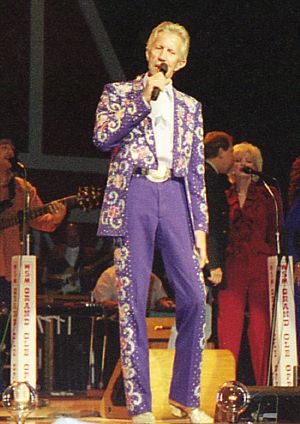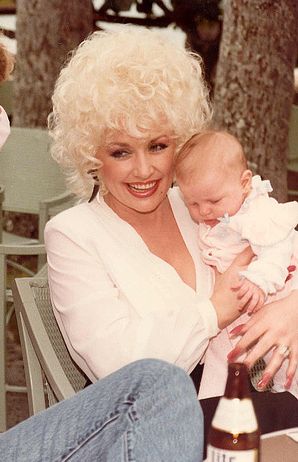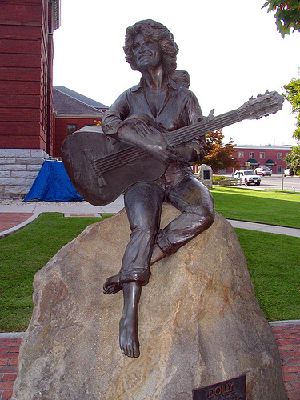Dolly Parton
| Dolly Parton | |
|---|---|
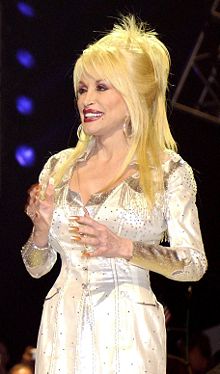 Dolly Parton in Nashville, Tennessee; 2005.
| |
| Background information | |
| Birth name | Dolly Rebecca Parton |
| Born | January 19 1946 (age 78) |
| Origin | Sevierville, Tennessee, U.S. |
| Genre(s) | Country, country pop, Bluegrass |
| Occupation(s) | Singer-songwriter, actress, author, philanthropist |
| Instrument(s) | Vocals, guitar, banjo, autoharp, piano |
| Years active | 1964 – present |
| Website | Dolly Parton Music |
Dolly Rebecca Parton (January 19, 1946 - ) is an American country music singer/songwriter, author, actress, entrepreneur, and philanthropist. One of the most successful country artists, as of 2008, she had 26 number-one singles (a record for a female performer) and 42 top 10 country albums (more than any other artist, male or female). She is one of the wealthiest female entertainers in the world.
The fourth of 12 children, Parton began singing at the Grand Ole Opry when she was 13 years old. The day after high school graduation in 1964, she moved to Nashville where she began working as a songwriter. From 1967 to 1974, Parton worked with veteran country artist Porter Wagoner, recording a string of hit country duets. In 1974, her song, "I Will Always Love You," written about her break from Wagoner, became a number one hit and was later one of the highest selling records of all time for Whitney Houston. In the 1970s and 1980s, Parton had a number of major hits, including "Here You Come Again," from her first million-selling album of the same name; "Islands in the Stream," sung with Kenny Rogers; and "9 to 5," which reached number one on both the country and pop charts.
Along with selling over 100 million records and starring in several movies, Parton has had considerable success as an entrepreneur, with businesses including a popular theme park, a film and television production studio, and several dinner clubs. In 1986, she was inducted into the Songwriters Hall of Fame, and in 1999, she was inducted into the Country Music Hall of fame. In 2005, Parton received the National Medal of Arts, the highest honor given by the U.S. government for excellence in the arts.
Early years
Childhood
Dolly Parton was born in Sevierville County, Tennessee, the fourth of 12 children born to Robert Lee Parton and Avie Lee Owens. Her family was, as she described them, "dirt poor." They lived in a rustic, dilapidated one-room cabin in Locust Ridge, a hamlet just north of Greenbrier in the Great Smoky Mountains. Parton's parents were parishioners in the Church of God (Cleveland, Tennessee), a Pentecostal denomination, and music was a very large part of her church experience.
On May 30, 1966, at the age of 20, she married Carl Dean in Ringgold, Georgia. She met Dean on her first day in Nashville, at age 18, at the Wishy-Washy Laundromat. Dean has always shunned publicity and rarely accompanies her to any events. Dean and Parton have no children together.
Discovery
Parton began performing as a child, singing on local radio and television programs in East Tennessee. By age 9, she was appearing on The Cas Walker Show on both WIVK Radio and WBIR-TV in Knoxville, Tennessee. At 13, she was already recording on a small record label, Goldband, and appearing at the Grand Ole Opry in Nashville, Tennessee. The day after she graduated from high school in 1964 she moved to Nashville, taking many traditional elements of folklore and popular music from East Tennessee with her.
Parton's initial success came as a songwriter, writing hit songs for Hank Williams, Jr. and Skeeter Davis. She signed with Monument Records in late 1965, where she was initially pitched as a pop singer. The label agreed to have Parton sing country music after her composition, "Put It Off Until Tomorrow," recorded by Bill Phillips (with Parton, uncredited, on harmony), went to number six on the country charts in 1966. Her first country single, "Dumb Blonde," reached No. 24 on the country charts in 1967, followed the same year with "Something Fishy," which went to number 17. The two songs anchored her first full-length album, Hello, I'm Dolly.
Music career
1967–1976: Country music success
In 1967, Parton was asked to join the weekly syndicated television program hosted by Porter Wagoner, replacing Norma Jean, who had returned to Oklahoma. Initially, Wagoner's audience was reluctant to warm to "Pretty Miss" Dolly Parton and chanted for Norma Jean, but with Wagoner's assistance, she was accepted. Wagoner also convinced his label, RCA, to also sign Parton. The label decided to protect its investment by releasing her first single as a duet with Wagoner. Their single, "The Last Thing on My Mind," reached the country Top Ten early in 1968, launching a six-year streak of virtually uninterrupted hits for the pair.
Parton's first solo single, "Just Because I'm a Woman," was released in the summer of 1968 and was a moderate hit, reaching number 17. For the remainder of the decade, none of her solo efforts—even "In the Good Old Days (When Times Were Bad)," which would later become a standard—were as successful as her duets with Wagoner. The duo was named Vocal Group of the Year in 1968 by the Country Music Association. Wagoner and Parton were both frustrated by her lack of solo success, in part because he had a significant financial stake in her future—as of 1969, he was her co-producer and owned nearly half of the publishing company Owepar.
By 1970, Wagoner advised her to record Jimmie Rodgers' "Mule Skinner Blues," complete with yodels, a gimmick that worked. The record shot to number three on the charts, followed closely by Parton's first number one single, "Joshua." For the next two years, she had a number of solo hits—including her signature song "Coat of Many Colors" (number four, 1971)—in addition to several successful duets. She had several additional successful singles, but none of them were blockbusters until "Jolene" reached number one in early 1974.
Parton took the first step in breaking her professional relationship with Wagoner by ceasing to tour with him. However, she continued to appear on television and record duets with him. Her break from Wagoner inspired the song "I Will Always Love You" which went to number one on the country charts and was later a mammoth hit by Whitney Houston.
1977–1986: Branching out
From 1974 to 1980, Parton consistently charted in the country Top Ten, with eight singles reaching number one. She also had her own syndicated television show, Dolly, in 1976. By the next year she gained the right to produce her own albums. In addition to her own hits during the late 1970s, many artists—from Rose Maddox and Kitty Wells to Olivia Newton-John, Emmylou Harris, and Linda Ronstadt—covered her songs.
Parton later had commercial success as a pop singer, as well as an actress. Her 1977 album, Here You Come Again, was her first million-seller, and the title track became her first top-ten single on the pop charts (reaching number three). Many of her subsequent singles charted on both the pop and country charts, simultaneously. Her albums during this period were developed specifically for pop/crossover success.
In 1978, Parton won the Grammy award for Best Female Country Vocal Performance for her Here You Come Again album. Following "Here You Come Again," she had further pop hits with "Two Doors Down," "Heartbreaker" (both 1978), "Baby I'm Burning," and "You're The Only One" (both 1979), all of which charted in the pop singles top 40, and all of which also topped the country singles chart. With less time to spend on her songwriting as she focused on a burgeoning film career, the early 1980s found Parton recording a larger percentage of material from noted pop songwriters, such as Barry Mann and Cynthia Weil, Rupert Holmes, Gary Portnoy, and Carole Bayer Sager.
Parton's commercial success continued to grow during 1980, with three number one hits in a row: The Donna Summer-written "Starting Over Again," "Old Flames (Can't Hold a Candle to You)," and "9 to 5." The latter was also the theme song to the 1980 movie Parton starred in along with Jane Fonda and Lily Tomlin. It not only reached number one on the country charts, but also number one on the pop and the adult contemporary charts, giving her a triple number-one hit. Parton thus became one of the few female country singers to have a number one single on the country and pop charts simultaneously.
Parton's singles continued to appear consistently in the country top ten. Between 1981 and 1985, she had 12 top ten hits, half of them number one singles. Parton continued to make inroads on the pop charts as well with a re-recorded version of "I Will Always Love You" from The Best Little Whorehouse in Texas scraping the top 50 in 1982, and her duet with Kenny Rogers, "Islands in the Stream" spending two weeks at number one in 1983.
However, by 1985, many old-time fans had felt that Parton was spending too much time courting the mainstream. Most of her albums were dominated by the adult contemporary pop of songs like "Islands in the Stream," and it had been years since she had sung straightforward country. She also continued to explore new business and entertainment ventures such as her Dollywood theme park, which opened in 1986. Her sales were still relatively strong, however, with "Save the Last Dance for Me," "Tennessee Homesick Blues" (both 1984), "Don't Call it Love Love," "Real Love" (a 1985 duet with Kenny Rogers), and "Think About Love" (1986) all reaching the U.S. country singles top ten, including several number ones. However, RCA Records did not renew her contract after it expired that year, and she signed with Columbia in 1987.
1987–1994: Return to country roots
In 1987, along with Emmylou Harris and Linda Ronstadt, she released the Trio album, to critical acclaim. The album revitalized Parton's temporarily stalled music career, spending five weeks at number one on Billboard's Country Albums chart, selling several million copies, and producing four top ten country hits, including Phil Spector's "To Know Him Is To Love Him," which went to number one. Trio was nominated for a Grammy Award for Album Of The Year and won the Grammy for "Best Country Vocal Performance—Duo or Group." A second and more contemporary collaboration with Harris and Ronstadt, Trio II, would see release in 1999, and would be another Grammy-winning success. In 1993, she teamed up with fellow country music queens Loretta Lynn and Tammy Wynette for a similar project, the Honky Tonk Angels album.
In 1989, Parton's album White Limozeen, which produced two number one hits in "Why'd You Come in Here Lookin' Like That" and "Yellow Roses." A 1991 duet with Ricky Van Shelton, "Rockin' Years," reached number one in 1991. However, Parton's greatest commercial fortune of the decade—and probably of all-time—came when Whitney Houston recorded "I Will Always Love You" for The Bodyguard soundtrack in 1992, and both the single and the album were massively successful. In 1994, she recorded the album Honky Tonk Angels with Loretta Lynn and Tammy Wynette. The album was certified "Gold" by the RIAA, and helped revive the careers of both Wynette and Lynn.
1995–present: Career today
Parton re-recorded "I Will Always Love You" with Vince Gill, and they won a CMA award for vocal event in 1996. Taken from the album Trio II, a cover of "After the Gold Rush" won a Grammy for Best Country Collaboration with Vocals in 1999, and Parton was inducted into the Country Music Hall of Fame later that year.
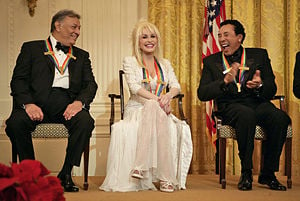
She recorded a series of critically acclaimed bluegrass albums, beginning with "The Grass is Blue" (1999) and "Little Sparrow" (2001), both of which won Grammy Awards. Her 2002 album, Halos & Horns included a bluegrass version of the Led Zeppelin classic "Stairway to Heaven." In 2005, Parton released Those Were The Days, her interpretation of hits from the folk-rock era of the late 1960s through early 1970s. The album featured such classics as John Lennon's "Imagine," Cat Stevens' "Where Do The Children Play," Tommy James' "Crimson & Clover," and Pete Seeger's folk classic "Where Have All The Flowers Gone."
In 2006, Parton earned her second Oscar nomination for "Travelin' Thru," which she wrote specifically for the film Transamerica. Due to the song's nature of accepting a transgender woman without judgment, Dolly received numerous death threats. She also returned to number one on the country charts later that year by lending her distinctive harmonies to the Brad Paisley ballad, "When I Get Where I'm Going."
In September 2007, Parton released her first single off her own record company, Dolly Records titled, "Better Get to Livin'," which eventually peaked at No. 48 on the Hot Country Songs chart.
Her latest album, Backwoods Barbie was released February 26, 2008, and reached #2 on the country charts. The album's debut at number 17 on the all-genre Billboard 200 albums chart was the highest in her career. The title song was written as part of the score for the musical 9 to 5, an adaptation of the 1980 movie of the same name.
Entrepreneur
Parton's net worth has been estimated at between $100 and $500 million, making her one of the wealthiest female entertainers in the world. In 1998, Nashville Business ranked her as the wealthiest country music star.
Parton invested much of her earnings into business ventures in her native East Tennessee, notably Pigeon Forge, which includes a theme park named Dollywood and a dinner show called Dolly Parton's Dixie Stampede, which also has venues in Branson, Missouri and Myrtle Beach, South Carolina. She also owns Sandollar Productions, a film and television production company.
Philanthropic efforts
Since the mid-1980s, Parton has been praised for her many charitable efforts, particularly in the area of literacy. Her literacy program, "Dolly Parton's Imagination Library," which mails one book per month to children from the time of their birth until they enter kindergarten, began in Sevier County, Tennessee, but has now been replicated in 566 counties across 36 U.S. states, as well as Canada and the UK.
Parton's efforts to preserve the bald eagle through the American Eagle Foundation's sanctuary at Dollywood earned her the Partnership Award from the U.S. Fish and Wildlife Service in 2003. She has also worked to raise money on behalf of several other causes, including the Red Cross and a number of HIV/AIDS-related charities.
Parton received the Woodrow Wilson Award for Public Service from the Woodrow Wilson International Center for Scholars of the Smithsonian Institution at a ceremony in Nashville, Tennessee on November 8, 2007.
Legacy
Parton is one of the most-honored female country performers of all time. She has achieved 25 RIAA certified gold, platinum, and multi-platinum honors. She has had 26 songs reach number one on the Billboard country charts, a record for a female artist. She has 42 career top ten country albums, a record for any artist, and 110 hit singles at last count.
She has received seven Grammy Awards and a total of 42 Grammy nominations. At the American Music Awards she has won three awards, and has received 18 nominations. At the Country Music Association, she has received ten awards and 42 nominations. At the Academy of Country Music, she has won seven awards and 39 nominations. She is one of only five female artists—the others being Reba McEntire, Barbara Mandrell, Shania Twain, and Loretta Lynn)—to win the Country Music Association's highest honor, "Entertainer of the Year."
Parton was awarded a star on the Hollywood Walk of Fame for Recording in 1984, a star on the Nashville Star Walk for Grammy winners, and a bronze sculpture on the courthouse lawn in Sevierville, Tennessee. She has called the statue of herself in her hometown "the greatest honor," because it came from the people who knew her.
Parton also was named one of Ms. Magazine's Women of the Year. In 1986, she was inducted into the Nashville Songwriters Hall of Fame. In 1999, she was inducted into the Country Music Hall of Fame. She received an honorary doctorate from Carson-Newman College in 1990. This was followed by induction into the National Academy of Popular Music/Songwriters Hall of Fame in 2001. In 2002, Parton ranked number four in CMT's 40 Greatest Women of Country Music.
Parton was presented the Living Legend medal by the U.S. Library of Congress on April 14, 2004, for her contributions to the cultural heritage of the United States. This was followed in 2005 with the National Medal of Arts, the highest honor given by the U.S. government for excellence in the arts.
On December 3, 2006, Dolly Parton was honored by the Kennedy Center for the Performing Arts for her lifetime of contributions to the arts. Other 2006 honorees included Zubin Mehta, Steven Spielberg, Smokey Robinson, and Andrew Lloyd Webber.
ReferencesISBN links support NWE through referral fees
- Mahoney, Judith Pasternak. Dolly Parton. New York: NY Metro Books, 1998. ISBN 9781567995572.
- Miller, Stephen. Smart Blonde: Dolly Parton. Music Sales; 2nd edition, 2008. ISBN 9781846097607.
- Parton, Dolly. Dolly: My Life and Other Unfinished Business. New York: HarperCollins, 1994. ISBN 9780060177201.
- Scobey, Lola. Dolly Parton: Daughter of the South. New York: Kensington Pub. Co., 1977. ISBN 9780890832950.
External links
All links retrieved April 2, 2015.
- Dolly Parton Music (official music site) www.dollypartonmusic.net
- Official site www.dollyparton.com
- Dolly Parton On-Line www.dollyon-line.com
- Dolly Parton at the Internet Movie Database www.imdb.com
- Dolly Parton discography at MusicBrainz musicbrainz.org
- Country Music Hall of Fame and Museum www.countrymusichalloffame.com
Credits
New World Encyclopedia writers and editors rewrote and completed the Wikipedia article in accordance with New World Encyclopedia standards. This article abides by terms of the Creative Commons CC-by-sa 3.0 License (CC-by-sa), which may be used and disseminated with proper attribution. Credit is due under the terms of this license that can reference both the New World Encyclopedia contributors and the selfless volunteer contributors of the Wikimedia Foundation. To cite this article click here for a list of acceptable citing formats.The history of earlier contributions by wikipedians is accessible to researchers here:
The history of this article since it was imported to New World Encyclopedia:
Note: Some restrictions may apply to use of individual images which are separately licensed.
